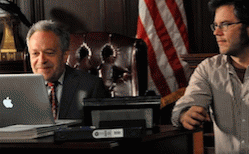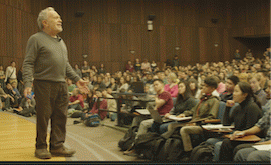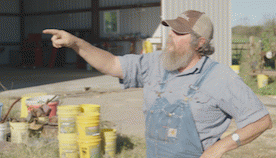| Back OpEd News | |||||||
|
Original Content at https://www.opednews.com/articles/Robert-Reich-and-Jake-Korn-by-Joan-Brunwasser-Capitalism_Democracy_Documentary_Economics-160506-414.html (Note: You can view every article as one long page if you sign up as an Advocate Member, or higher). |
|||||||
May 6, 2016
Robert Reich and Jake Kornbluth: Off to Save Capitalism
By Joan Brunwasser
Our new long form project: Saving Capitalism. We started "Inequality Media", that makes short videos explaining the economy in a way everyone can understand. The real story is what the rules of the market are, and who they benefit and who they hurt.Last year, we had a goal of 15 million views, and we wound up hitting 25...The work on this is ongoing and difficult, but I can't think of anything I'd rather be doing.
::::::::
Interview with Jake Kornbluth, director of the documentary, Inequality for All and the upcoming, much anticipated Saving Capitalism
My guest today is Jacob Kornbluth, award-winning director of the documentary, Inequality for All.
JB: Welcome back to OpEdNews, Jake. We last talked about a year and a half ago, when Inequality for All came out. For those of our readers who may not have seen it yet, can you tell us briefly what it was about?
JK: Inequality For All follows (former secretary of labor under Clinton) Robert Reich as he gives context to widening economic inequality, and why it is bad for us all -- not just the poor, and middle class, but the rich as well. The big idea in the film is that economic inequality is bad for our economy and for our democracy. Economically, consumers don't have enough money to buy anything so the overall economy stagnates. But economic inequality also affects our democracy. As more and more money goes to the top, so does the political power to control the system. Regular people wind up feeling the game is rigged, and the losers of a rigged game can get very angry.
That makes it sound like it is just a political treatise, but my background is in comedy (believe it or not!) and I think what surprised people who watched the film was that a film about a topic as seemingly heavy as economic inequality could be entertaining and funny. It helped, of course, that Robert Reich is incredibly funny himself and that we had a great time making it.
JB: Also, let's not forget those terrific graphics which added a lot to our understanding of the issues at hand. Okay. You made the film, set up a useful website full of concrete suggestions for how to move things forward. So, how did it go? Did a lot of people see the film? It didn't have a traditional theatre run. Did you get many visitors to your website? Did you stir things up?
JK: We did have a theatrical run, and very successful one at that. The film was released by The Weinstein Company, though their Radius Division. It came out in over 250 cities, and did the best box office of any issue documentary since Waiting For Superman. I haven't checked recently, but it was above 90% on rotten tomatoes for the entire release, so critics were very positive about it it as well.
As for the impact.... you always want more, but my favorite part of making it is, to this day, Bob and I get a few e-mails each week from high school students or college students who saw it in class, or from a conservative who saw it and was blown away by how much they liked it, or from a middle class person who saw it and "got it" for the first time. Many people who haven't seen the film still have a basic understanding of how widening economic inequality has affected our economy and our democracy. The film continues to have a life and make an impact.
JB: How gratifying. The film made me understand income inequality and its fallout in a way that I hadn't up until then. I have a sneaking suspicion that you're not resting on your collective laurels these days, Jake. So, what are you two up to?
JK: I thought you'd never ask! I want to tell you about our new long form project, Saving Capitalism, but it is easiest to understand as a continuum from Inequality For All. Since Inequality For All, I've started a nonprofit with Reich, called "Inequality Media", that makes short videos explaining the economy in a way everyone can understand. Last year, we had a goal of 15 million views, and we wound up hitting 25 million. This year, we set an ambitious goal of 30 million views for the year. To date -- mid April -- we have over 45 million views already.
JB: Wow! That's impressive.
JK: The fascinating thing about the response is that it proves that people are looking for smart, sensible ways to understand complex economic ideas. Those economic ideas affect their lives, and they know it.
That work has led to our new long form project, Saving Capitalism. In it, we acknowledge that the usual debate about economics boils down to if you are an activist government liberal, or a (so called) free market conservative. This is a false, meaningless debate. The real story is what the rules of the market are, and who they benefit and who they hurt.
To test this theory, we go with Reich out of the "bubble" of the coast, and take a road trip through the heartland of America to see if his ideas can be heard. It's a fascinating experiment, and one that I can't wait to share the results of. We've launched a kickstarter to help us finish the footage. The link is here.
JB: How much do you want to raise? How long do you have to do it? Can you give us a clue about what you've discovered on your road trip so far? I'm hooked; tell me more!
JK: We are trying to raise $256,500, and to bring the film out into the world around the presidential election. What I've learned is that it is incredibly hard to have discussions about big ideas when people are so entrenched in their ideological corners. What Robert Reich is trying to say to them is that he doesn't want those who see themselves as conservative to suddenly change to progressive. He wants them to see that the coming political organization -- in his view -- has more to do with if you are "anti-establishment" or "establishment" than if you are on the so-called "left" or "right". If you focus on how capitalism works and who it is working for, that becomes very clear. But people are angry, and a lot of the uncertainty they are feeling is a barrier to discussing a big concept like this. That's exactly what makes it worth doing, though.
JB: Agreed. If it's as good asInequality for All, it will be powerful indeed. Anything you'd like to add before we wrap this up?
JK: Just that the work on this is ongoing and difficult, but I can't think of anything I'd rather be doing. I get to wake up every day and do work I think is important, which is a blessing. I feel like I"m doing my small part to try and make things better. Thank you for taking the time to talk to me about this, and keep an eye out for Saving Capitalism!
JB: I most certainly will! Thanks so much for talking with me again, Jake. You love what you do and it shows! Good luck with your Kickstarter campaign. I hope this interview will motivate our readers to participate in this lovely project.
***
Reich's book: Saving Capitalism, For the Many, Not the Few
Producer/Director Jake Kornbluth Shares the Backstory of "Inequality for All", part one, October 24, 2013
Producer/Director Jake Kornbluth Shares the Backstory of "Inequality for All", part two, October 24, 2013
my interview with Robert Reich about Inequality for All
Inequality for All website
Inequality for All is available on Netflix
Authors Website: http://www.opednews.com/author/author79.html
Authors Bio:
Joan Brunwasser is a co-founder of Citizens for Election Reform (CER) which since 2005 existed for the sole purpose of raising the public awareness of the critical need for election reform. Our goal: to restore fair, accurate, transparent, secure elections where votes are cast in private and counted in public. Because the problems with electronic (computerized) voting systems include a lack of transparency and the ability to accurately check and authenticate the vote cast, these systems can alter election results and therefore are simply antithetical to democratic principles and functioning.
Since the pivotal 2004 Presidential election, Joan has come to see the connection between a broken election system, a dysfunctional, corporate media and a total lack of campaign finance reform. This has led her to enlarge the parameters of her writing to include interviews with whistle-blowers and articulate others who give a view quite different from that presented by the mainstream media. She also turns the spotlight on activists and ordinary folks who are striving to make a difference, to clean up and improve their corner of the world. By focusing on these intrepid individuals, she gives hope and inspiration to those who might otherwise be turned off and alienated. She also interviews people in the arts in all their variations - authors, journalists, filmmakers, actors, playwrights, and artists. Why? The bottom line: without art and inspiration, we lose one of the best parts of ourselves. And we're all in this together. If Joan can keep even one of her fellow citizens going another day, she considers her job well done.
When Joan hit one million page views, OEN Managing Editor, Meryl Ann Butler interviewed her, turning interviewer briefly into interviewee. Read the interview here.
While the news is often quite depressing, Joan nevertheless strives to maintain her mantra: "Grab life now in an exuberant embrace!"
Joan has been Election Integrity Editor for OpEdNews since December, 2005. Her articles also appear at Huffington Post, RepublicMedia.TV and Scoop.co.nz.



